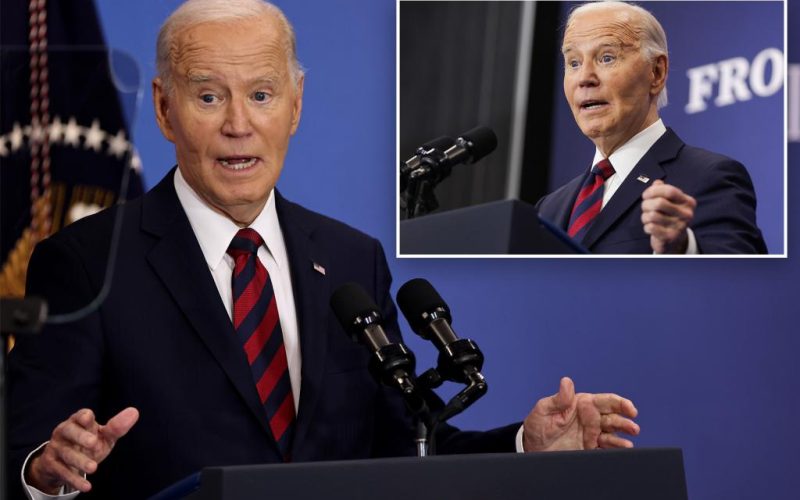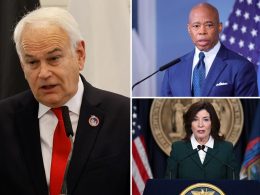President Biden’s teleprompter apparently short-circuited Tuesday during one of his final speeches touting his economic record — which included an abortive effort to massively expand rural high-speed internet — forcing him to consult paper notes to make up for the technical difficulties.
“One of the things that’s going on here — they just turned off my … I lost electricity here, anyway,” Biden said, visibly taken off guard just 10 minutes into his speech at the Brookings Institution in Washington, D.C.
Some Americans who were promised broadband access in underserved and rustic locales as part of Biden’s $1.2 trillion infrastructure law — but have yet to receive internet access — have been similarly left in the dark.
The 82-year-old president continued impromptu for part of his more than 30 minute speech, fighting through a cold to deliver the address on what he called the “fairly strong economy” he was handing off to his predecessor “at least at the moment.”
“Most economists agree the new administration is going to inherit a fairly strong economy, at least at the moment,” Biden went on, in between coughs. “An economy going through fundamental transformation. It’s laid out a stronger foundation and a sustainable, broad-based, highly productive growth.”
“It is my profound hope that the new administration will preserve and build on this progress, like most great economic developments, this one is neither red nor blue, and America’s progress is everyone’s progress,” he added.
Biden also addressed some of the economic difficulties he faced in his term, admitting the economy was not “perfect” and that “still too many working- and middle-class families struggle with high prices for housing and groceries and the daily needs of life.”
To sell the point, the lame-duck president — whose current net worth sits reportedly at $10 million — joked that he was for years “the poorest” member of Congress — though previous reports have cast doubt on that superlative, with other lawmakers in both chambers ranking beneath him.
“Of course, this economic growth is not without pain. The entire world faced a spike in inflation due to disruptions from the pandemic and Putin’s war in Ukraine,” he said, ignoring even left-of-center economists who faulted the trillions in federal spending passed during the first year of his administration for fueling a 40-year inflationary high.
“We acted quickly to get inflation down,” he claimed, “with the help of Republicans and Democrats, inflation came down to pre-pandemic levels.”
Part of that spending came from the bipartisan infrastructure bill, which included a $65 billion program for undeveloped regions to “ensure every American has access to high-speed internet.”
The lackluster execution of the multi-billion dollar project has left some fuming, as the timeline for completion was continually pushed back.
“By the way, if you think about the high-speed internet systems,” Biden noted, seemingly unaware of his administration’s progress on the issue. “They’re as consequential to farmers as electricity was during the during the administration of [former President Franklin D.] Roosevelt. I’m serious.”
The largest funding recipient of the high-speed internet rollout was the Broadband Equity, Access, and Deployment (BEAD) Program, which has $42.5 billion set aside for states to establish internet services.
But the BEAD program has had difficulty transferring the money to directly create internet opportunities, leading Sen. John Thune (R-SD) to say in September, “Three years and $42 billion later, not one person has been connected to the internet under the BEAD program.”
FCC Commissioner Brendan Carr, who was appointed by Trump in 2017, has said the timeline for providing high-speed internet to the intended areas will not be completed until 2030 — nine years after the bill was passed.
“There hasn’t been a single shovel’s worth of dirt that has even been turned towards connecting people,” Carr said, per the Washington Times.
BEAD program leader Alan Davidson responded in May the slow pace is due to “planning and preparation” and argued that it “is really a 2025, 2026 shovels-in-the-ground project,” the outlet reported.
The timeline of the internet implementation may hit an even bigger snag in the Trump administration.
Sen. Joni Ernst (R-Iowa) has already urged Elon Musk and Vivek Ramaswamy to get their Department of Government Efficiency (DOGE) to cut funding for the program.
“President Biden’s so-called infrastructure program provided $7.5 billion to build a nationwide network of electric vehicle (EV) charging stations and $42 billion to expand broadband,” Ernst (R-Iowa) wrote in a letter to the DOGE co-chairs, according to the outlet Broadband Breakfast.
“Three years later, just 17 EV stations are completed and not a single person—not one—has been connected to the internet yet. It’s time to pull the plug.”
The lame-duck president’s speech at the Washington think tank was bookended by demonstrations on another contentious issue for his administration: Israel’s war in the Gaza Strip.
Anti-Israel protesters camped out just one block from the venue, with one holding up a banner that implored Biden to “Stop Arming Israel” and another farther down the sidewalk on 18th St. NW chanting “Genocide Joe” as they waved Palestinian flags.
At the close of his speech, Biden raised his voice and shouted in anticipation of the next administration: “If we don’t lead the world, who will?”
The president was joined at the Brookings event by Rep. Brendan Boyle (D-Pa.) — one of several Democrats who called for him to abandon his 2024 run — and Acting Labor Secretary Julie Su, his only cabinet-level official not to receive Senate confirmation.








